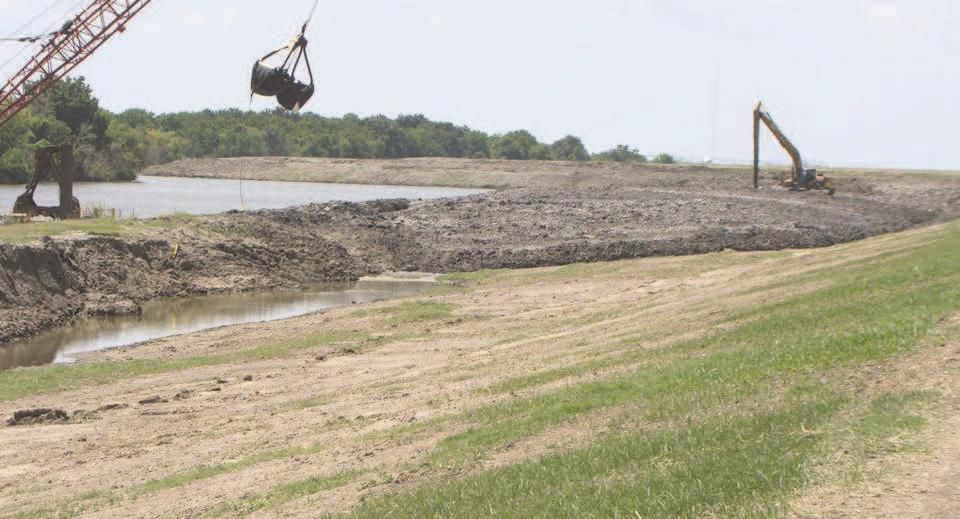
Sharon Kay Lirette
September 27, 2016
Almost Famous: Colonels fall on late-game 2-point try in overtime
September 28, 2016The oil and gas industry may be slower than most would like it to be.
But an influx of money coming to our state in the next few years may diversify the area’s workforce and ensure laborers are busy in the future.
The BP settlement numbers are out, and Louisiana is set to receive more than $10 billion in fines, penalties and damages – making it the largest environmental settlement in the history of the country.
A large piece of that $10 billion will go toward coastal restoration, which will help preserve the state’s future, but will also keep people in Louisiana at work.
“The stars have sort of lined up for us,” said Simone Theriot Maloz, the executive director for Restore or Retreat, a local non-profit that aims to curb erosion’s destruction on the region’s coast. “This is the day we’ve all dreamed of. Lots of money is going to be available for us to benefit, and I think that it can potentially create a lot of jobs for the state’s economy, as well,” she said.
The job creation is something the area could use right about now.
With the price of oil hovering just north of $40 per barrel, oil companies are struggling to make ends meet – a problem experts predict will get better, but will likely take some time to fully realize.
Port Fourchon executive director Chett Chiasson said he’s been told the price will likely climb gradually, but even as it does, work will not speed up right away.
Economic expert Loren Scott agreed, saying in his most recent state economic report there’s a bit more rain yet to come before we get to the rainbow.
“The process of recovery will not happen overnight,” Scott said.
But with the BP settlement cash set to flow into both state and parish coffers, Maloz said she predicts a new sector will emerge to diversify Louisiana’s economy – the water management sector.
This field will include all of the jobs that will become available once coastal restoration work begins – levee building, crane operating or whatever else will be needed.
A study conducted by the Restore the Mississippi River Delta Coalition in February concluded the industry is now the second largest employment sector in Louisiana – trailing just the oil and gas industry.
The report said the industry has 44,000 jobs currently – a number that will continue to grow as settlement payments are received.
Maloz said the work is similar to the oilfield in terms of its difficulty and the skill and education level required to be qualified.
The average salary is also similar. Workers in the water management sector made an average of $69,277 per year, according to the coalition report.
“Investing in coastal restoration will create jobs and grow the economy, in addition to protecting existing businesses and communities,” said David Muth, the National Wildlife Federation’s gulf restoration director, who also represents the Restore the Mississippi River Delta Coalition. “Investments made today in water management will more than pay off in the long run as our region becomes an economic hub for coastal restoration and climate resiliency, while also helping to protect the people, industries and wildlife that call Louisiana home,” Muth said. The water management sector has another thing in common with oil and gas.
As with oilfield exploration, work in water management can be exported to other places.
Maloz said one of the most exciting things about the growth of coastal restoration business in Louisiana is that it can all be packaged and taken to other states for profit, as well.
She said several Louisiana workers already in the field have been transplanted during national disaster events such as hurricanes.
“This new water sector can be exported,” Maloz said. “You can take it other places and use it there. There were a lot of Louisiana folks who were on-site lending a hand after Hurricane Sandy on the Northeast. What we’ll be doing here, we can do anywhere else, too. A lot of our people will have opportunities to find work here or anywhere.
“This is something that we really believe will give a lot of opportunities to businesses who want to transition themselves into this line of work – a way to stay active,” she added.
The work involved is vital to the future of the state, as well.
Maloz said spending the BP settlement wisely is one of the biggest decisions the state has ever faced – an issue she believes will decide the future of Louisiana’s coast. The Public Affairs Research Council of Louisiana also recently weighed in on the subject, calling for transparency in how the state spends the billions of coastal repair dollars.
Restore and Retreat held a workshop last week designed to gather industry leaders, government officials and coastal stakeholders to consider the Coastal Restoration and Protection Authority’s 2017 Master Plan. The focus of the event was to help companies win restoration and protection work from local and state governments.
Maloz said the problem of coastal erosion isn’t ever going to go away, and a lot of land that’s already disappeared will never come back.
But finally – after years of planning and patient waiting, there is revenue in place to get something done. Maloz can’t wait. Neither can Muth. They can’t wait to see the results.
“We have a golden opportunity to set our region on a course of greater economic prosperity and improved environmental health for generations to come,” Muth said.
“This is the day we all have planned for,” Maloz added. “When we didn’t have money, we made plans for the day that we did. But now, that money is finally on the way. It’s here. And we’re excited. Help is finally on the way.”
Levee work has been ongoing for several years in Lafourche Parish. With the economy struggling, experts say coastal restoration may bring jobs to the area.










